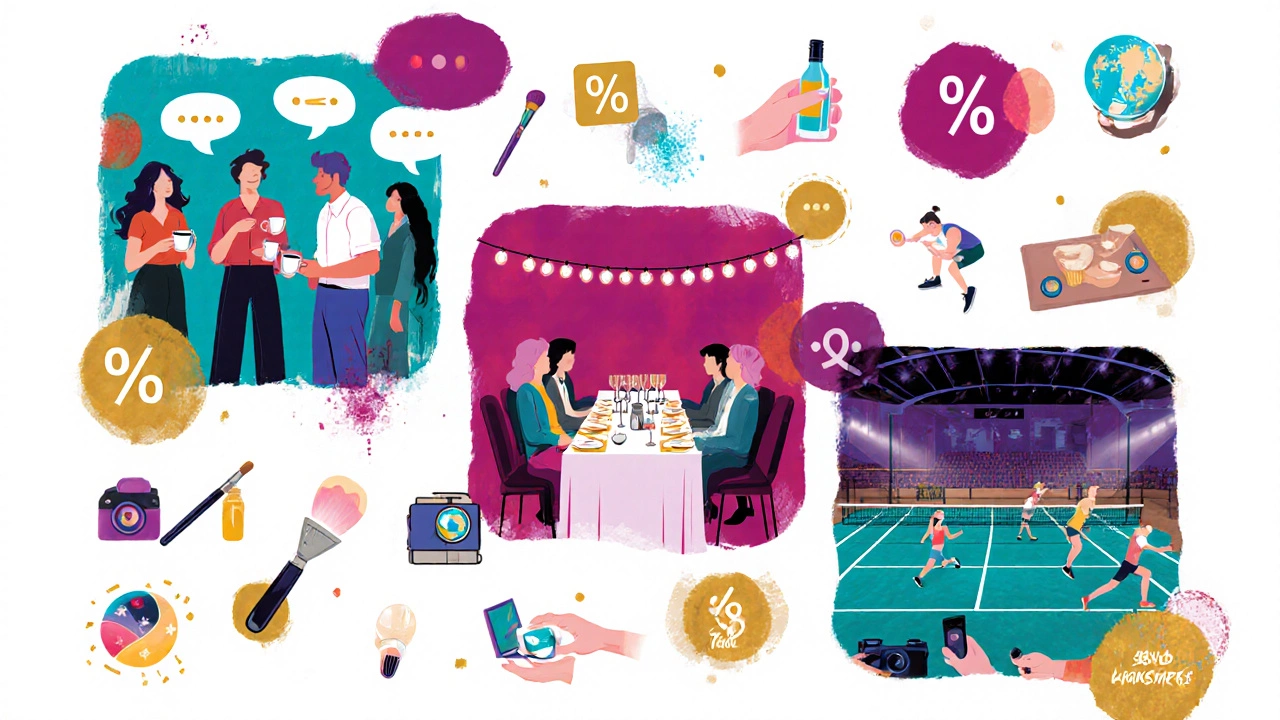Social Club Benefits Finder
Recommended Club Benefits for You
Club Match Summary
How It Works
This tool matches your interests with the benefits typically offered by different types of social clubs. Select your primary interest and preferred club type to see which benefits align with your goals.
Remember to consider factors like cost, location, and meeting schedules when choosing a club.
Ever wondered what you actually get when you sign up for a social club is a member‑based organization that brings people together around shared interests, activities, or causes? The answer isn’t just a fancy drink on Friday night - it’s a bundle of networking, learning, and community experiences that can reshape your social life. Below you’ll find a plain‑language guide that walks through every major offering, helps you spot the right fit, and warns against common missteps.
Key Takeaways
- Social clubs provide structured networking, exclusive events, and access to facilities that would be costly alone.
- Members enjoy discounts, skill‑building workshops, and a sense of belonging that boosts wellbeing.
- Choosing the right club means matching your interests, location, and budget with the club’s core focus.
- Watch out for hidden fees, overly restrictive rules, or clubs that don’t deliver on promised activities.
What Exactly Is a Social Club?
A social club functions as a community hub where members gather for regular social, recreational, or charitable activities. Clubs can be as small as a neighborhood book group or as large as a city‑wide sporting association. The common thread is a membership model that funds shared resources, event planning, and sometimes charitable outreach.
Core Benefits Offered by Social Clubs
1. Networking Opportunities
One of the biggest draws is networking the process of meeting new people who can help you personally or professionally. Whether you’re a recent graduate hunting for a job or a parent looking for play‑dates, clubs create low‑pressure environments where introductions happen naturally. Regular mixers, mentorship programs, and themed discussion nights turn acquaintances into contacts.
2. Access to Member‑Only Events
Clubs curate a calendar packed with activities you won’t find on public event boards. From wine‑tasting evenings and art workshops to charity runs and speaker series, member events exclusive gatherings organized for club members only add variety to your routine and often come at a lower cost than commercial tickets.
3. Facilities and Shared Resources
Many clubs own or lease physical spaces - think community halls, sports courts, or co‑working rooms. Access to club facilities amenities like meeting rooms, gyms, kitchens, or libraries that members can use can replace pricey gym memberships or venue rentals. For example, a tennis club may provide courts, equipment storage, and coaching sessions for a flat annual fee.
4. Discounts, Perks, and Partnerships
Because clubs negotiate group rates, members often enjoy discounts price reductions on goods or services offered through club partnerships. This can range from 10‑20% off local restaurants to free tickets for cultural festivals. Some clubs also bundle travel packages, health‑check‑ups, or insurance deals, turning membership into a value‑add package.
5. Skill Development and Learning
Beyond fun, clubs frequently host workshops, certifications, or hobby‑specific classes. Whether you want to learn photography, coding, or public speaking, a skill‑development program structured learning sessions offered to members can accelerate your progress. Many clubs invite industry experts, giving you insider knowledge without the usual price tag.
6. Community Impact and Volunteering
Social clubs often double as civic players. By organizing charity drives, environmental clean‑ups, or mentorship for youth, clubs let members give back while strengthening bonds. The sense of purpose that comes from collective action contributes to personal fulfillment and a positive public image.

Typical Types of Social Clubs
Understanding the club’s focus helps you predict the exact benefit mix. Here’s a quick rundown:
- Recreational clubs - sports, games, hobbies.
- Professional networking clubs - industry‑specific meet‑ups, alumni groups.
- Cultural clubs - language exchange, arts, heritage societies.
- Community service clubs - Rotary, Lions, local volunteer groups.
- Lifestyle clubs - wellness, travel, culinary experiences.
Each type prioritizes a different subset of the benefits listed above, but most overlap on networking, events, and community feel.
How to Choose the Right Social Club for You
- Identify Your Primary Goal - Are you after professional contacts, a new hobby, or a sense of belonging? Your goal narrows the field. \n
- Check Membership Costs and Hidden Fees - Compare the base fee, annual dues, and any extra charges for events or facility use.
- Visit a Trial Meeting - Most clubs allow guests. Observe the atmosphere, member interaction, and event quality.
- Assess Location and Timing - Convenience matters. A club far from home or with meetings that clash with work loses appeal.
- Read Reviews or Ask Current Members - Direct feedback reveals whether promised social club benefits are delivered.
Common Pitfalls and How to Avoid Them
Even with great intentions, you can end up in a club that feels more like a cost center than a community. Watch out for:
- Overly vague mission statements - If the club can’t explain what it does, it likely won’t deliver concrete benefits.
- High turnover rates - Frequent member loss signals poor engagement or leadership issues.
- Mandatory extra fees - Some clubs charge per event or for basic facility access; factor these into your budget.
- Exclusivity that feels exclusionary - A truly social club welcomes diverse backgrounds; cliquish atmospheres defeat the purpose.

Quick Checklist Before Signing Up
- Clear list of benefits (networking, events, facilities, discounts, learning).
- Transparent fee structure.
- Scheduled trial or open house.
- Positive member testimonials.
- Location and meeting times that suit your lifestyle.
Comparison of Typical Benefits Across Club Types
| Benefit | Recreational | Professional | Cultural | Service | Lifestyle |
|---|---|---|---|---|---|
| Networking | Peers with shared hobbies | Industry contacts & mentors | Cross‑cultural exchanges | Community leaders & NGOs | Wellness & travel partners |
| Events | Games nights, tournaments | Workshops, speaker series | Film screenings, festivals | Charity drives, fundraisers | Retreats, culinary tours |
| Facilities | Sports courts, gear | Co‑working spaces | Art studios, language labs | Meeting halls | Yoga studios, lounges |
| Discounts | Equipment rentals | Conference fees | Travel & museum tickets | Partner charity discounts | Health & spa offers |
| Skill Development | Coaching, technique drills | Certifications, webinars | Language classes, art lessons | Leadership training | Mindfulness workshops |
Frequently Asked Questions
What is the typical cost of joining a social club?
Fees vary widely: hobby clubs may charge $30‑$100 per year, while upscale lifestyle clubs can cost $300‑$1,000 annually. Always ask for a breakdown of dues, event fees, and optional extras before committing.
Can I try a club before becoming a member?
Most reputable clubs host open houses or allow guests for a single event. Treat these visits as interviews - assess the vibe, the quality of activities, and how welcomed you feel.
Do social clubs offer networking for non‑professionals?
Absolutely. While professional clubs focus on career growth, recreational and cultural clubs also foster strong personal networks that can lead to job referrals, collaborations, or simply a supportive circle of friends.
What kinds of events are typically included in membership?
Expect a mix of social mixers, skill‑building workshops, community service outings, and special interest gatherings. Some clubs also organize annual trips or themed festivals exclusive to members.
How do clubs negotiate member discounts?
Clubs pool member volume to secure bulk rates with local businesses, gyms, or cultural venues. The discount is then passed on to members, often via a members‑only coupon code or dedicated loyalty card.
Joining a social club isn’t just about filling an empty weekend slot - it’s an investment in relationships, personal growth, and community impact. By weighing the concrete benefits, checking costs, and testing the club’s culture, you’ll find a membership that truly adds value to your life.
